Non-Traditional Student Experiences: Research Analysis
VerifiedAdded on 2022/08/29
|5
|1046
|20
Homework Assignment
AI Summary
This assignment analyzes a research article focusing on the experiences of non-traditional students in higher education, specifically referencing a study conducted in Australia. The student identifies the authors' assumptions regarding the definition of 'non-traditional students,' noting the lack of explicit definition and the implicit assumption that readers understand the term. The assignment explores the problems the authors assume non-traditional students face, such as identity loss, isolation, and lack of support. The student then examines whether the research supports these assumptions, considers how research might differ in the UK, and reflects on their own identity as a non-traditional student. The analysis further identifies generalizations within the article, the use of hedging, and how these elements influence the validity and nuance of the study's conclusions. Finally, the assignment includes a bibliography of relevant sources.
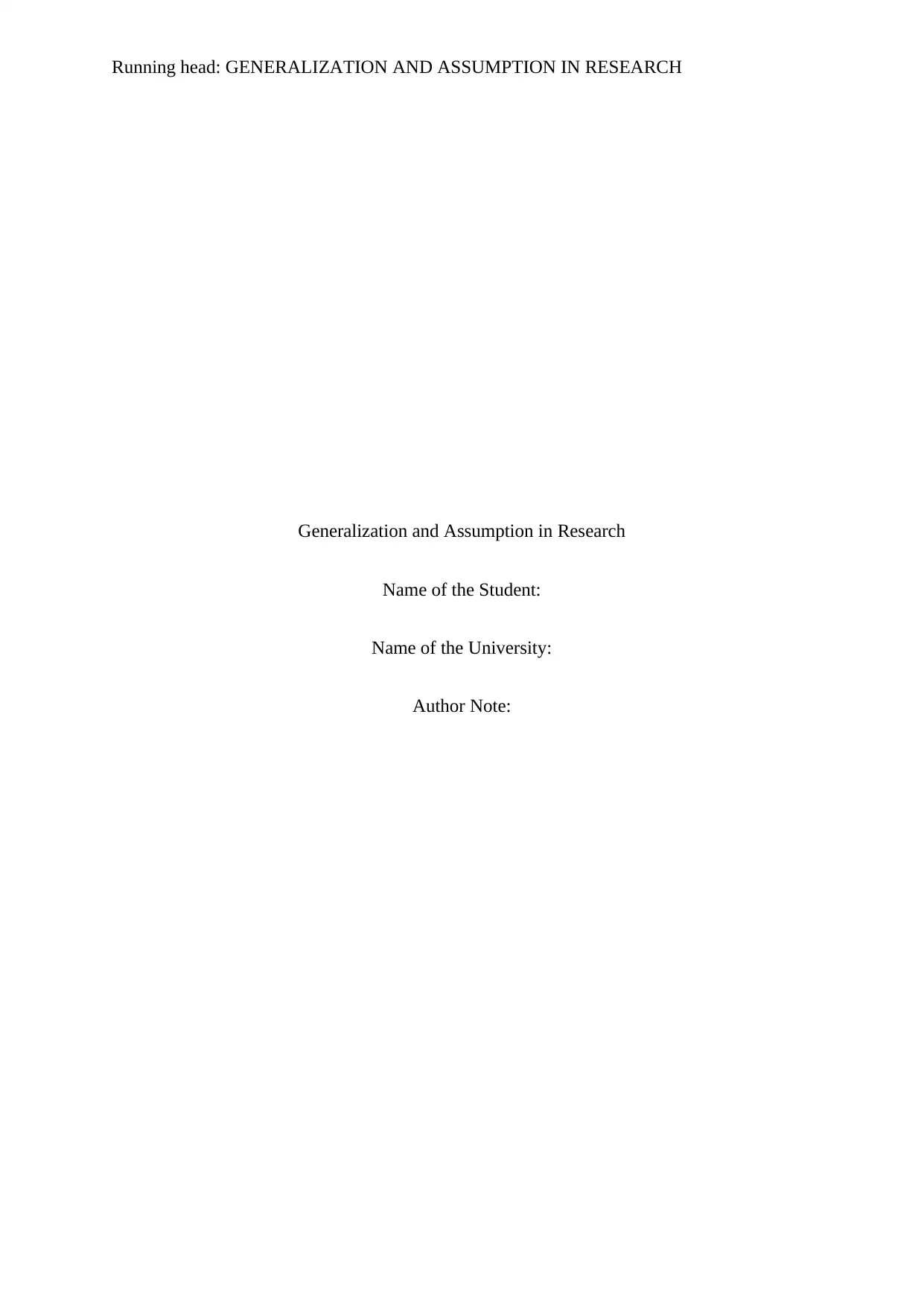
Running head: GENERALIZATION AND ASSUMPTION IN RESEARCH
Generalization and Assumption in Research
Name of the Student:
Name of the University:
Author Note:
Generalization and Assumption in Research
Name of the Student:
Name of the University:
Author Note:
Paraphrase This Document
Need a fresh take? Get an instant paraphrase of this document with our AI Paraphraser
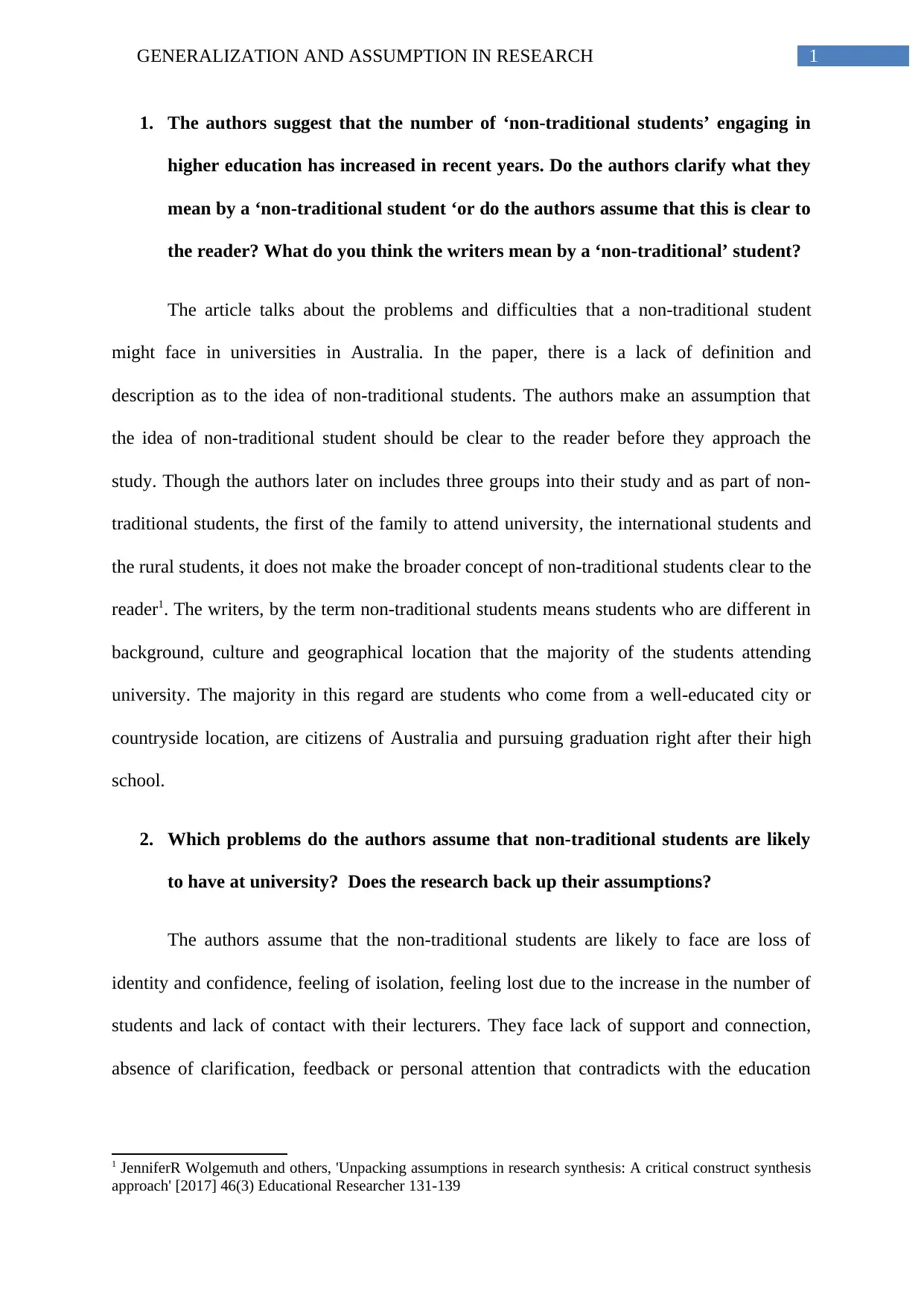
1GENERALIZATION AND ASSUMPTION IN RESEARCH
1. The authors suggest that the number of ‘non-traditional students’ engaging in
higher education has increased in recent years. Do the authors clarify what they
mean by a ‘non-traditional student ‘or do the authors assume that this is clear to
the reader? What do you think the writers mean by a ‘non-traditional’ student?
The article talks about the problems and difficulties that a non-traditional student
might face in universities in Australia. In the paper, there is a lack of definition and
description as to the idea of non-traditional students. The authors make an assumption that
the idea of non-traditional student should be clear to the reader before they approach the
study. Though the authors later on includes three groups into their study and as part of non-
traditional students, the first of the family to attend university, the international students and
the rural students, it does not make the broader concept of non-traditional students clear to the
reader1. The writers, by the term non-traditional students means students who are different in
background, culture and geographical location that the majority of the students attending
university. The majority in this regard are students who come from a well-educated city or
countryside location, are citizens of Australia and pursuing graduation right after their high
school.
2. Which problems do the authors assume that non-traditional students are likely
to have at university? Does the research back up their assumptions?
The authors assume that the non-traditional students are likely to face are loss of
identity and confidence, feeling of isolation, feeling lost due to the increase in the number of
students and lack of contact with their lecturers. They face lack of support and connection,
absence of clarification, feedback or personal attention that contradicts with the education
1 JenniferR Wolgemuth and others, 'Unpacking assumptions in research synthesis: A critical construct synthesis
approach' [2017] 46(3) Educational Researcher 131-139
1. The authors suggest that the number of ‘non-traditional students’ engaging in
higher education has increased in recent years. Do the authors clarify what they
mean by a ‘non-traditional student ‘or do the authors assume that this is clear to
the reader? What do you think the writers mean by a ‘non-traditional’ student?
The article talks about the problems and difficulties that a non-traditional student
might face in universities in Australia. In the paper, there is a lack of definition and
description as to the idea of non-traditional students. The authors make an assumption that
the idea of non-traditional student should be clear to the reader before they approach the
study. Though the authors later on includes three groups into their study and as part of non-
traditional students, the first of the family to attend university, the international students and
the rural students, it does not make the broader concept of non-traditional students clear to the
reader1. The writers, by the term non-traditional students means students who are different in
background, culture and geographical location that the majority of the students attending
university. The majority in this regard are students who come from a well-educated city or
countryside location, are citizens of Australia and pursuing graduation right after their high
school.
2. Which problems do the authors assume that non-traditional students are likely
to have at university? Does the research back up their assumptions?
The authors assume that the non-traditional students are likely to face are loss of
identity and confidence, feeling of isolation, feeling lost due to the increase in the number of
students and lack of contact with their lecturers. They face lack of support and connection,
absence of clarification, feedback or personal attention that contradicts with the education
1 JenniferR Wolgemuth and others, 'Unpacking assumptions in research synthesis: A critical construct synthesis
approach' [2017] 46(3) Educational Researcher 131-139
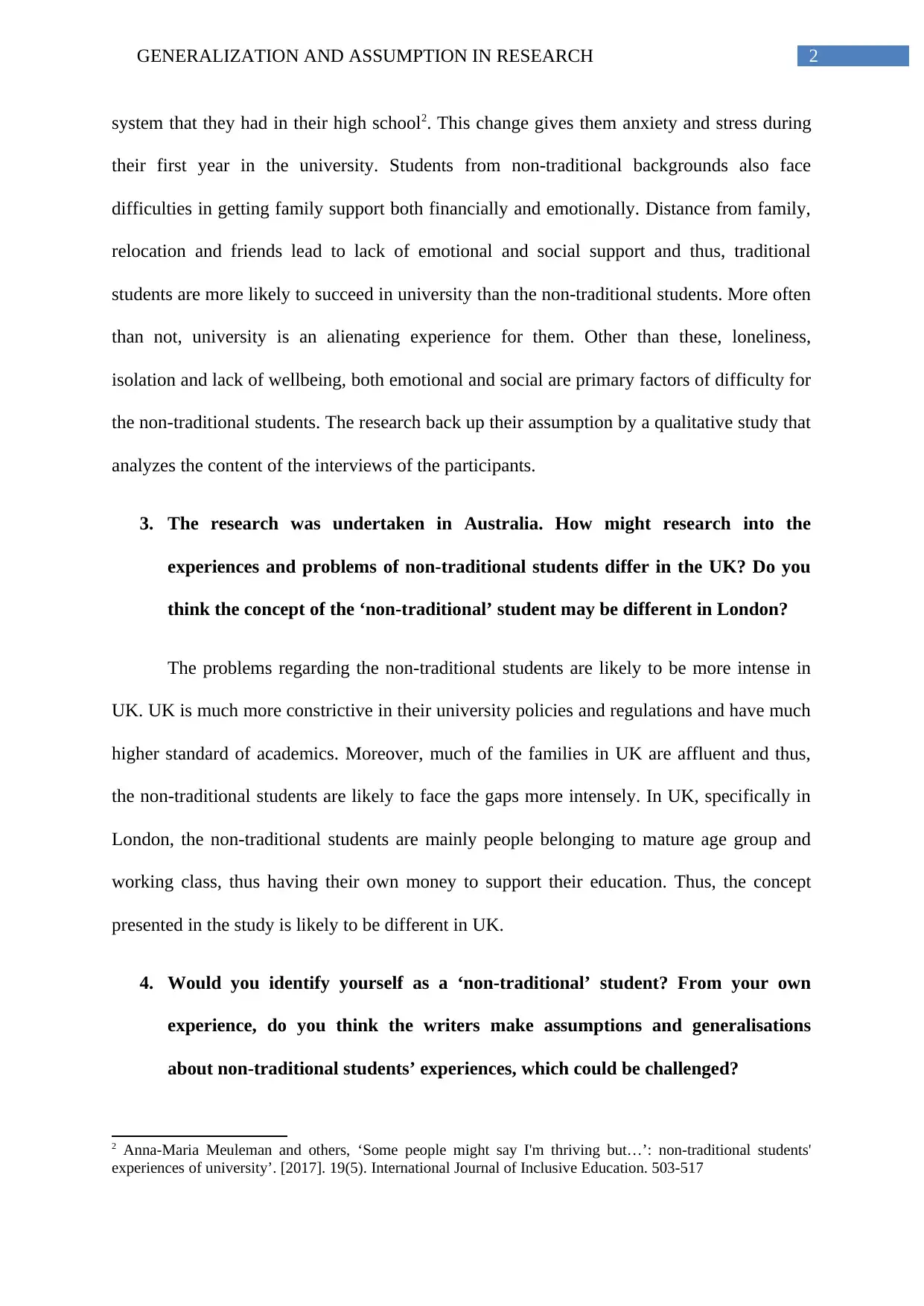
2GENERALIZATION AND ASSUMPTION IN RESEARCH
system that they had in their high school2. This change gives them anxiety and stress during
their first year in the university. Students from non-traditional backgrounds also face
difficulties in getting family support both financially and emotionally. Distance from family,
relocation and friends lead to lack of emotional and social support and thus, traditional
students are more likely to succeed in university than the non-traditional students. More often
than not, university is an alienating experience for them. Other than these, loneliness,
isolation and lack of wellbeing, both emotional and social are primary factors of difficulty for
the non-traditional students. The research back up their assumption by a qualitative study that
analyzes the content of the interviews of the participants.
3. The research was undertaken in Australia. How might research into the
experiences and problems of non-traditional students differ in the UK? Do you
think the concept of the ‘non-traditional’ student may be different in London?
The problems regarding the non-traditional students are likely to be more intense in
UK. UK is much more constrictive in their university policies and regulations and have much
higher standard of academics. Moreover, much of the families in UK are affluent and thus,
the non-traditional students are likely to face the gaps more intensely. In UK, specifically in
London, the non-traditional students are mainly people belonging to mature age group and
working class, thus having their own money to support their education. Thus, the concept
presented in the study is likely to be different in UK.
4. Would you identify yourself as a ‘non-traditional’ student? From your own
experience, do you think the writers make assumptions and generalisations
about non-traditional students’ experiences, which could be challenged?
2 Anna-Maria Meuleman and others, ‘Some people might say I'm thriving but…’: non-traditional students'
experiences of university’. [2017]. 19(5). International Journal of Inclusive Education. 503-517
system that they had in their high school2. This change gives them anxiety and stress during
their first year in the university. Students from non-traditional backgrounds also face
difficulties in getting family support both financially and emotionally. Distance from family,
relocation and friends lead to lack of emotional and social support and thus, traditional
students are more likely to succeed in university than the non-traditional students. More often
than not, university is an alienating experience for them. Other than these, loneliness,
isolation and lack of wellbeing, both emotional and social are primary factors of difficulty for
the non-traditional students. The research back up their assumption by a qualitative study that
analyzes the content of the interviews of the participants.
3. The research was undertaken in Australia. How might research into the
experiences and problems of non-traditional students differ in the UK? Do you
think the concept of the ‘non-traditional’ student may be different in London?
The problems regarding the non-traditional students are likely to be more intense in
UK. UK is much more constrictive in their university policies and regulations and have much
higher standard of academics. Moreover, much of the families in UK are affluent and thus,
the non-traditional students are likely to face the gaps more intensely. In UK, specifically in
London, the non-traditional students are mainly people belonging to mature age group and
working class, thus having their own money to support their education. Thus, the concept
presented in the study is likely to be different in UK.
4. Would you identify yourself as a ‘non-traditional’ student? From your own
experience, do you think the writers make assumptions and generalisations
about non-traditional students’ experiences, which could be challenged?
2 Anna-Maria Meuleman and others, ‘Some people might say I'm thriving but…’: non-traditional students'
experiences of university’. [2017]. 19(5). International Journal of Inclusive Education. 503-517
⊘ This is a preview!⊘
Do you want full access?
Subscribe today to unlock all pages.

Trusted by 1+ million students worldwide
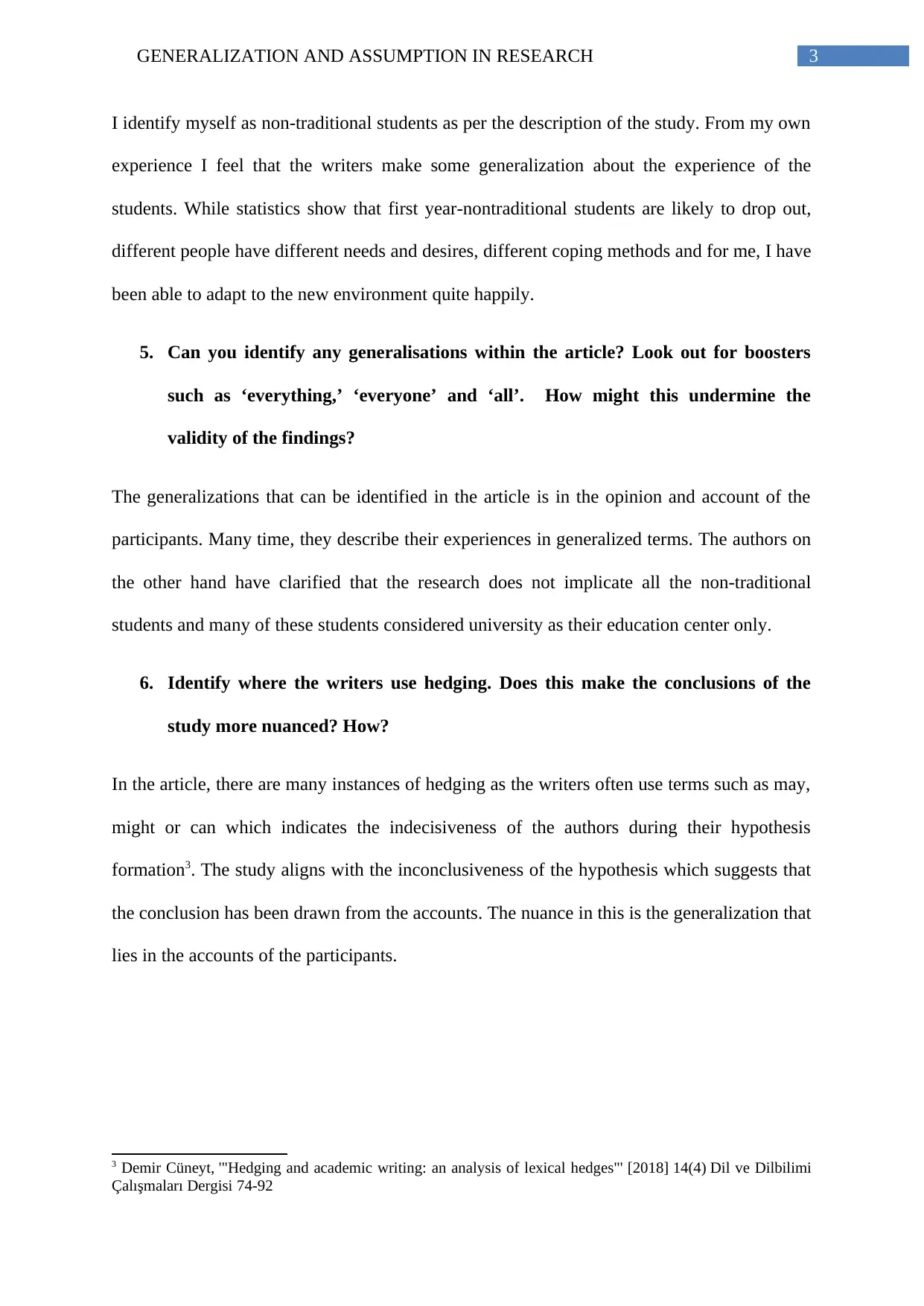
3GENERALIZATION AND ASSUMPTION IN RESEARCH
I identify myself as non-traditional students as per the description of the study. From my own
experience I feel that the writers make some generalization about the experience of the
students. While statistics show that first year-nontraditional students are likely to drop out,
different people have different needs and desires, different coping methods and for me, I have
been able to adapt to the new environment quite happily.
5. Can you identify any generalisations within the article? Look out for boosters
such as ‘everything,’ ‘everyone’ and ‘all’. How might this undermine the
validity of the findings?
The generalizations that can be identified in the article is in the opinion and account of the
participants. Many time, they describe their experiences in generalized terms. The authors on
the other hand have clarified that the research does not implicate all the non-traditional
students and many of these students considered university as their education center only.
6. Identify where the writers use hedging. Does this make the conclusions of the
study more nuanced? How?
In the article, there are many instances of hedging as the writers often use terms such as may,
might or can which indicates the indecisiveness of the authors during their hypothesis
formation3. The study aligns with the inconclusiveness of the hypothesis which suggests that
the conclusion has been drawn from the accounts. The nuance in this is the generalization that
lies in the accounts of the participants.
3 Demir Cüneyt, '"Hedging and academic writing: an analysis of lexical hedges"' [2018] 14(4) Dil ve Dilbilimi
Çalışmaları Dergisi 74-92
I identify myself as non-traditional students as per the description of the study. From my own
experience I feel that the writers make some generalization about the experience of the
students. While statistics show that first year-nontraditional students are likely to drop out,
different people have different needs and desires, different coping methods and for me, I have
been able to adapt to the new environment quite happily.
5. Can you identify any generalisations within the article? Look out for boosters
such as ‘everything,’ ‘everyone’ and ‘all’. How might this undermine the
validity of the findings?
The generalizations that can be identified in the article is in the opinion and account of the
participants. Many time, they describe their experiences in generalized terms. The authors on
the other hand have clarified that the research does not implicate all the non-traditional
students and many of these students considered university as their education center only.
6. Identify where the writers use hedging. Does this make the conclusions of the
study more nuanced? How?
In the article, there are many instances of hedging as the writers often use terms such as may,
might or can which indicates the indecisiveness of the authors during their hypothesis
formation3. The study aligns with the inconclusiveness of the hypothesis which suggests that
the conclusion has been drawn from the accounts. The nuance in this is the generalization that
lies in the accounts of the participants.
3 Demir Cüneyt, '"Hedging and academic writing: an analysis of lexical hedges"' [2018] 14(4) Dil ve Dilbilimi
Çalışmaları Dergisi 74-92
Paraphrase This Document
Need a fresh take? Get an instant paraphrase of this document with our AI Paraphraser
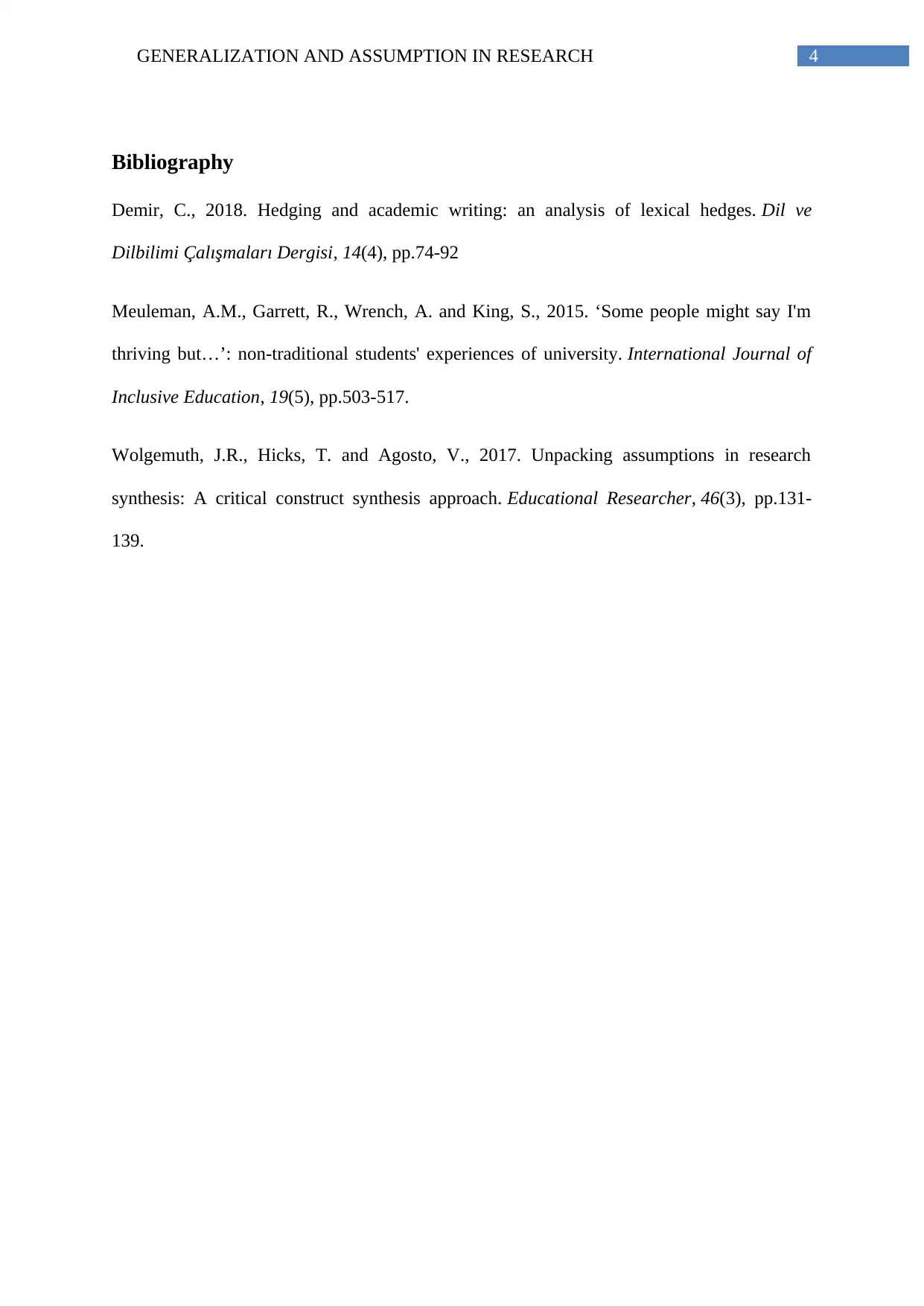
4GENERALIZATION AND ASSUMPTION IN RESEARCH
Bibliography
Demir, C., 2018. Hedging and academic writing: an analysis of lexical hedges. Dil ve
Dilbilimi Çalışmaları Dergisi, 14(4), pp.74-92
Meuleman, A.M., Garrett, R., Wrench, A. and King, S., 2015. ‘Some people might say I'm
thriving but…’: non-traditional students' experiences of university. International Journal of
Inclusive Education, 19(5), pp.503-517.
Wolgemuth, J.R., Hicks, T. and Agosto, V., 2017. Unpacking assumptions in research
synthesis: A critical construct synthesis approach. Educational Researcher, 46(3), pp.131-
139.
Bibliography
Demir, C., 2018. Hedging and academic writing: an analysis of lexical hedges. Dil ve
Dilbilimi Çalışmaları Dergisi, 14(4), pp.74-92
Meuleman, A.M., Garrett, R., Wrench, A. and King, S., 2015. ‘Some people might say I'm
thriving but…’: non-traditional students' experiences of university. International Journal of
Inclusive Education, 19(5), pp.503-517.
Wolgemuth, J.R., Hicks, T. and Agosto, V., 2017. Unpacking assumptions in research
synthesis: A critical construct synthesis approach. Educational Researcher, 46(3), pp.131-
139.
1 out of 5
Related Documents
Your All-in-One AI-Powered Toolkit for Academic Success.
+13062052269
info@desklib.com
Available 24*7 on WhatsApp / Email
![[object Object]](/_next/static/media/star-bottom.7253800d.svg)
Unlock your academic potential
Copyright © 2020–2026 A2Z Services. All Rights Reserved. Developed and managed by ZUCOL.





